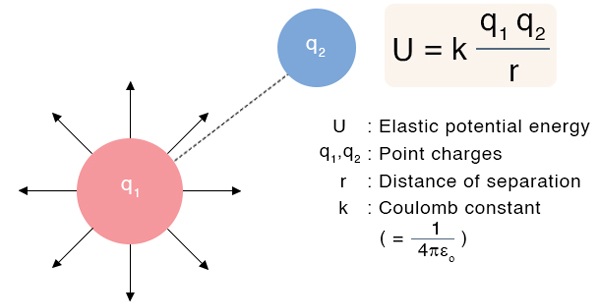AP Physics 2- 10.4 Electric Potential Energy- Study Notes- New Syllabus
AP Physics 2- 10.4 Electric Potential Energy – Study Notes
AP Physics 2- 10.4 Electric Potential Energy – Study Notes – per latest Syllabus.
Key Concepts:
- Electric Potential Energy (U)
- Electric Potential Difference (ΔV)
- Relationship Between Electric Potential (V) and Electric Field (E)
- Equipotential Lines
Electric Potential Energy (U)
Electric potential energy is the energy stored in a system of charges due to their relative positions in an electric field.
- It represents the work done to assemble the charge configuration or the work required to move charges in the presence of other charges.
- It is a scalar quantity.
Potential energy of two point charges:
\( U = \dfrac{1}{4 \pi \varepsilon_0} \dfrac{q_1 q_2}{r} \)
Properties:
- Reference point: Potential energy is defined relative to infinity (\(U = 0\) at \(r \to \infty\)).
- Like charges (\(+/+ \) or \(-/-\)) → \( U > 0 \), repulsive interaction.
- Unlike charges (\(+/-\)) → \( U < 0 \), attractive interaction.
- Electric potential energy is conserved in electrostatic processes → total energy (kinetic + potential) remains constant.
Example :
Two point charges, \( \text{Q}_1 = 3 \, \mu\text{C} \) and \( \text{Q}_2 = 2 \, \mu\text{C} \), are separated by a distance of 0.4 m in vacuum. Find the electric potential energy of the system.
▶️ Answer/Explanation
Formula for electric potential energy between two point charges:
\( \text{U} = k \dfrac{\text{Q}_1 \text{Q}_2}{r} \)
Step 1: Substitute values: \( k = 9.0 \times 10^9 \, \text{N·m²/C²}, \text{Q}_1 = 3 \times 10^{-6} \, \text{C}, \text{Q}_2 = 2 \times 10^{-6} \, \text{C}, r = 0.4 \, \text{m} \)
Step 2: Calculate: \( \text{U} = (9.0 \times 10^9) \dfrac{(3 \times 10^{-6})(2 \times 10^{-6})}{0.4} \)
= \( (9.0 \times 10^9) \dfrac{6 \times 10^{-12}}{0.4} \)
= \( 1.35 \times 10^{-1} \, \text{J} \)
Answer: Electric potential energy of the system ≈ 0.135 J
Example :
Two point charges, \( q_1 = +2 \, \mu C \) and \( q_2 = -3 \, \mu C \), are placed 0.2 m apart in vacuum. Find the electric potential energy of the system.
▶️ Answer/Explanation
Formula: \( U = \dfrac{1}{4 \pi \varepsilon_0} \dfrac{q_1 q_2}{r} \)
= \( (9 \times 10^9) \dfrac{(2 \times 10^{-6})(-3 \times 10^{-6})}{0.2} \)
= \( (9 \times 10^9)(-6 \times 10^{-12})/0.2 \)
= \( -0.27 \, J \)
Answer: The electric potential energy = \( -0.27 \, J \) (negative → attractive interaction).
